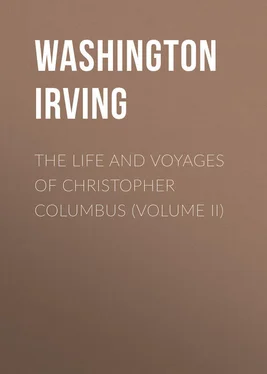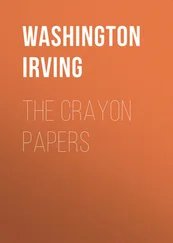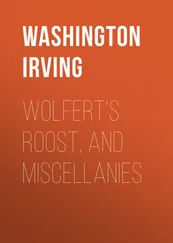Washington Irving - The Life and Voyages of Christopher Columbus (Volume II)
Здесь есть возможность читать онлайн «Washington Irving - The Life and Voyages of Christopher Columbus (Volume II)» — ознакомительный отрывок электронной книги совершенно бесплатно, а после прочтения отрывка купить полную версию. В некоторых случаях можно слушать аудио, скачать через торрент в формате fb2 и присутствует краткое содержание. Жанр: foreign_antique, foreign_prose, на английском языке. Описание произведения, (предисловие) а так же отзывы посетителей доступны на портале библиотеки ЛибКат.
- Название:The Life and Voyages of Christopher Columbus (Volume II)
- Автор:
- Жанр:
- Год:неизвестен
- ISBN:нет данных
- Рейтинг книги:5 / 5. Голосов: 1
-
Избранное:Добавить в избранное
- Отзывы:
-
Ваша оценка:
- 100
- 1
- 2
- 3
- 4
- 5
The Life and Voyages of Christopher Columbus (Volume II): краткое содержание, описание и аннотация
Предлагаем к чтению аннотацию, описание, краткое содержание или предисловие (зависит от того, что написал сам автор книги «The Life and Voyages of Christopher Columbus (Volume II)»). Если вы не нашли необходимую информацию о книге — напишите в комментариях, мы постараемся отыскать её.
The Life and Voyages of Christopher Columbus (Volume II) — читать онлайн ознакомительный отрывок
Ниже представлен текст книги, разбитый по страницам. Система сохранения места последней прочитанной страницы, позволяет с удобством читать онлайн бесплатно книгу «The Life and Voyages of Christopher Columbus (Volume II)», без необходимости каждый раз заново искать на чём Вы остановились. Поставьте закладку, и сможете в любой момент перейти на страницу, на которой закончили чтение.
Интервал:
Закладка:
Chapter II
On arriving at Isabella, Don Bartholomew found it, as usual, a scene of misery and repining. Many had died during his absence; most were ill. Those who were healthy complained of the scarcity of food, and those who were ill, of the want of medicines. The provisions distributed among them, from the supply brought out a few months before by Pedro Alonzo Niño, had been consumed. Partly from sickness, and partly from a repugnance to labor, they had neglected to cultivate the surrounding country, and the Indians, on whom they chiefly depended, outraged by their oppressions, had abandoned the vicinity, and fled to the mountains; choosing rather to subsist on roots and herbs, in their rugged retreats, than remain in the luxuriant plains, subject to the wrongs and cruelties of the white men. The history of this island presents continual pictures of the miseries, the actual want and poverty, produced by the grasping avidity of gold. It had rendered the Spaniards heedless of all the less obvious, but more certain and salubrious, sources of wealth. All labor seemed lost that was to produce profit by a circuitous process. Instead of cultivating the luxuriant soil around them, and deriving real treasures from its surface, they wasted their time in seeking for mines and golden streams, and were starving in the midst of fertility.
No sooner were the provisions exhausted which had been brought out by Niño, than the colonists began to break forth in their accustomed murmurs. They represented themselves as neglected by Columbus, who, amidst the blandishments and delights of a court, thought little of their sufferings. They considered themselves equally forgotten by government; while, having no vessel in the harbor, they were destitute of all means of sending home intelligence of their disastrous situation, and imploring relief.
To remove this last cause of discontent, and furnish some object for their hopes and thoughts to rally round, the Adelantado ordered that two caravels should be built at Isabella, for the use of the island. To relieve the settlement, also, from all useless and repining individuals, during this time of scarcity, he distributed such as were too ill to labor, or to bear arms, into the interior, where they would have the benefit of a better climate, and more abundant supply of Indian provisions. He at the same time completed and garrisoned the chain of military posts established by his brother in the preceding year, consisting of five fortified houses, each surrounded by its dependent hamlet. The first of these was about nine leagues from Isabella, and was called la Esperanza. Six leagues beyond was Santa Catalina. Four leagues and a half further was Magdalena, where the first town of Santiago was afterwards founded; and five leagues further Fort Conception – which was fortified with great care, being in the vast and populous Vega, and within half a league from the residence of its cacique, Guarionex. 9 9 P. Martyr, decad. i. lib. v. Of the residence of Guarionex, which must have been a considerable town, not the least vestige can be discovered at present. Vol. II. – 2.
Having thus relieved Isabella of all its useless population, and left none but such as were too ill to be removed, or were required for the service and protection of the place, and the construction of the caravels, the Adelantado returned, with a large body of the most effective men, to the fortress of San Domingo.
The military posts, thus established, succeeded for a time in overawing the natives; but fresh hostilities were soon manifested, excited by a different cause from the preceding. Among the missionaries who had accompanied Friar Boyle to the island, were two of far greater zeal than their superior. When he returned to Spain, they remained, earnestly bent upon the fulfillment of their mission. One was called Roman Pane, a poor hermit, as he styled himself, of the order of St. Geronimo; the other was Juan Borgoñon, a Franciscan. They resided for some time among the Indians of the Vega, strenuously endeavoring to make converts, and had succeeded with one family, of sixteen persons, the chief of which, on being baptized, took the name of Juan Mateo. The conversion of the cacique Guarionex, however, was their main object. The extent of his possessions made his conversion of great importance to the interests of the colony, and was considered by the zealous fathers a means of bringing his numerous subjects under the dominion of the church. For some time he lent a willing ear; he learnt the Pater Noster, the Ave Maria, and the Creed, and made his whole family repeat them daily. The other caciques of the Vega and of the provinces of Cibao, however, scoffed at him for meanly conforming to the laws and customs of strangers, usurpers of his domains, and oppressors of his nation. The friars complained that, in consequence of these evil communications, their convert suddenly relapsed into infidelity; but another and more grievous cause is assigned for his recantation. His favorite wife was seduced or treated with outrage by a Spaniard of authority; and the cacique renounced all faith in a religion which, as he supposed, admitted of such atrocities. Losing all hope of effecting his conversion, the missionaries removed to the territories of another cacique, taking with them Juan Mateo, their Indian convert. Before their departure, they erected a small chapel, and furnished it with an altar, crucifix, and images, for the use of the family of Mateo.
Scarcely had they departed, when several Indians entered the chapel, broke the images in pieces, trampled them under foot, and buried them in a neighboring field. This, it was said, was done by order of Guarionex, in contempt of the religion from which he had apostatized. A complaint of this enormity was carried to the Adelantado, who ordered a suit to be immediately instituted, and those who were found culpable, to be punished according to law. It was a period of great rigor in ecclesiastical law, especially among the Spaniards. In Spain, all heresies in religion, all recantations from the faith, and all acts of sacrilege, either by Moor or Jew, were punished with fire and fagot. Such was the fate of the poor ignorant Indians, convicted of this outrage on the church. It is questionable whether Guarionex had any hand in this offence, and it is probable that the whole affair was exaggerated. A proof of the credit due to the evidence brought forward may be judged by one of the facts recorded by Roman Pane, "the poor hermit." The field in which the holy images were buried, was planted, he says, with certain roots shaped like a turnip, or radish, several of which coming up in the neighborhood of the images, were found to have grown most miraculously in the form of a cross. 10 10 Escritura de Fr. Roman, Hist. del Almirante.
The cruel punishment inflicted on these Indians, instead of daunting their countrymen, filled them with horror and indignation. Unaccustomed to such stern rule and vindictive justice, and having no clear ideas nor powerful sentiments with respect to religion of any kind, they could not comprehend the nature nor extent of the crime committed. Even Guarionex, a man naturally moderate and pacific, was highly incensed with the assumption of power within his territories, and the inhuman death inflicted on his subjects. The other caciques perceived his irritation, and endeavored to induce him to unite in a sudden insurrection, that by one vigorous and general effort they might break the yoke of their oppressors. Guarionex wavered for some time. He knew the martial skill and prowess of the Spaniards; he stood in awe of their cavalry, and he had before him the disastrous fate of Caonabo; but he was rendered bold by despair, and he beheld in the domination of these strangers the assured ruin of his race. The early writers speak of a tradition current among the inhabitants of the island, respecting this Guarionex. He was of an ancient line of hereditary caciques. His father, in times long preceding the discovery, having fasted for five days, according to their superstitious observances, applied to his zemi, or household deity, for information of things to come. He received for answer, that within a few years there should come to the island a nation covered with clothing, which should destroy all their customs and ceremonies, and slay their children or reduce them to painful servitude. 11 11 Peter Martyr, decad. i. lib. ix.
The tradition was probably invented by the Butios, or priests, after the Spaniards had begun to exercise their severities. Whether their prediction had an effect in disposing the mind of Guarionex to hostilities is uncertain. Some have asserted that he was compelled to take up arms by his subjects, who threatened, in case of his refusal, to choose some other chieftain; others have alleged the outrage committed upon his favorite wife, as the principal cause of his irritation. 12 12 Las Casas, Hist. Ind., lib. i. cap. 121.
It was probably these things combined, which at length induced him to enter into the conspiracy. A secret consultation was held among the caciques, wherein it was concerted, that on the day of payment of their quarterly tribute, when a great number could assemble without causing suspicion, they should suddenly rise upon the Spaniards and massacre them. 13 13 Herrera, decad. i. lib. iii. cap. 65. Peter Martyr, decad. vi. lib. v.
Интервал:
Закладка:
Похожие книги на «The Life and Voyages of Christopher Columbus (Volume II)»
Представляем Вашему вниманию похожие книги на «The Life and Voyages of Christopher Columbus (Volume II)» списком для выбора. Мы отобрали схожую по названию и смыслу литературу в надежде предоставить читателям больше вариантов отыскать новые, интересные, ещё непрочитанные произведения.
Обсуждение, отзывы о книге «The Life and Voyages of Christopher Columbus (Volume II)» и просто собственные мнения читателей. Оставьте ваши комментарии, напишите, что Вы думаете о произведении, его смысле или главных героях. Укажите что конкретно понравилось, а что нет, и почему Вы так считаете.












